Original image via A. Patrusheva
When I decided to ask horror writers about the childhood fears they’d carried into adulthood, and how those fears may have shaped or still shape their fiction, I knew I was going to get some interesting answers. However, nothing could have prepared me for the depth and diversity of the answers I received. From sharks to abandonment, from faces in the window to being voiceless—there is a lot to digest below.
I remember reading once that we’re not afraid of being alone in the dark; we’re afraid of not being alone in the dark, and that got me thinking about this very common childhood fear. As kids we know darkness just hides the things that are there during the day, but we also know that the back of the chair sprouts arms and eyes, that certain creatures only come out at night, that ghosts haunt the dark, that demons move better under its cover, and that killers love to operate at night to stay out of sight. As adults, we know these same things, and even if we’re not still afraid, some of them stay with us because we learn pretty early that "darkness" can be many things. I spent most of my life near and in the ocean. I need the ocean to recharge my soul. However, even while I’m swimming around, drinking beer, spending time with friends and enjoying myself, there’s a tiny voice in the back of my head talking about Jaws, reminding me that sharks are real (fear of sharks and water popped up a few times, which made me feel great and also like we need a to start a club…). Anyway, I asked a few of my favorite horror writers about their childhood fears and how they shaped their work. This is what they had to say.
Cynthia Pelayo, author of "Children of Chicago"
 “Yes, abduction. Growing up in the 80s and 90s in Chicago, many of us kids in the neighborhood knew about the clown who took people (John Wayne Gacy). I mean, for a time there in Chicago there was a phenomena where kids were convincing each other and their parents that they saw a clown driving around the neighborhood trying to lure children into a van. So, this fear definitely stayed with me. It wasn’t necessarily that he was a clown that scared me, but that this was a man, a human being, who took people away and did violent things to them and then discarded them. That fear of never being seen by friends and loved ones again haunts me. Fear and distrust of strangers—of everyone—continues to impact my work today.”
“Yes, abduction. Growing up in the 80s and 90s in Chicago, many of us kids in the neighborhood knew about the clown who took people (John Wayne Gacy). I mean, for a time there in Chicago there was a phenomena where kids were convincing each other and their parents that they saw a clown driving around the neighborhood trying to lure children into a van. So, this fear definitely stayed with me. It wasn’t necessarily that he was a clown that scared me, but that this was a man, a human being, who took people away and did violent things to them and then discarded them. That fear of never being seen by friends and loved ones again haunts me. Fear and distrust of strangers—of everyone—continues to impact my work today.”
Get Children of Chicago at Bookshop or Amazon
Christopher Golden, author of "Road of Bones", "Red Hands", and "The Ghosts of Who You Were"
“I'm sure I have loads of them. I'm not sure how deep you want to get. One of them, I think, is letting people down, because that's literally all my father ever did. That's a central theme of my next novel, which will be out next year from St. Martin's. But the one that echoes the most didn't really crop up until I was about 30, which is when one of my uncles began to show symptoms of Alzheimer's. I've seen it take a lot of people since then, but back then I wrote two novels all about the erosion of personal identity.”
Get Road of Bones at Bookshop or Amazon
R.J. Joseph, author of the upcoming "Hell Hath No Sorrow Like a Woman Haunted"
“The one childhood fear of mine that stuck with me and appears in my work a lot is the fear of voicelessness, or lack of agency. I know this looks, on the surface, like wanting to control everything. And I guess it is that. For me, it's also the idea that I might not have the agency to be who I really am, or do the things I want to do. So I've always feared being taken over, like in Invasion of the Body Snatchers or Get Out, where the real me is hidden but people around me might think the imposter is really me. Possession movies fall in this category, too."
Get Books by R.J. Joseph at Amazon
Alma Katsu, author of "The Hunger", "Red Widow", and the upcoming "The Fervor"
“I grew up in a very creepy rundown Victorian. It had been the minister's house, his wife died in it, there was a huge trunk filled with old clothes in the unfinished attic. Our parents expected us to use the attic as a space in play in (I still have nightmares about that attic). That house is probably responsible for my dark outlook on life—that and being raised Roman Catholic.”
Get The Fervor at Bookshop or Amazon
Jonathan Janz, author of "Children of the Dark" and "The Raven"
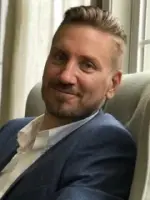 “Okay, so my mom was young when she had me and was considered very pretty. She was an Indiana Pacers' cheerleader but had to give that up when she had me. Anyway, after she and my dad divorced (I was four), there followed a barrage of stalkers who absolutely terrorized my mom (and me). This manifested in the frequent visitations of peeping toms. For several reasons I won't go into (because they would infuriate me anew and make me break my keyboard), when my mom went to the police, they'd basically say, 'It sounds harmless,' or 'Can't you just wear a robe around the house?'
“Okay, so my mom was young when she had me and was considered very pretty. She was an Indiana Pacers' cheerleader but had to give that up when she had me. Anyway, after she and my dad divorced (I was four), there followed a barrage of stalkers who absolutely terrorized my mom (and me). This manifested in the frequent visitations of peeping toms. For several reasons I won't go into (because they would infuriate me anew and make me break my keyboard), when my mom went to the police, they'd basically say, 'It sounds harmless,' or 'Can't you just wear a robe around the house?'
Which brings me to my childhood fear: seeing leering faces in the windows. Many times, I'd be walking to my room or lying in bed, I'd look up, and there'd be a bearded, glitter-eyed face staring at me or scanning the house for a glimpse of my mom. It scared the hell out of me, obviously, and it happened quite a few times.
When I look at my work now, I see that moment replaying sometimes. In a book coming out soon (Marla), that's part of the central premise: a character looking at a window and seeing something terrifying. I have no doubt that this stems from my childhood experiences and the ill treatment my mom received.”
Get Books by Jonathan Janz at Amazon
Michelle Garza, half of the Sisters of Slaughter with Melissa Lason, authors of "Those Who Follow" and "Kingdom of Teeth"
“I have a few. Water/the ocean has always frightened me because I almost drowned as a kid. Melissa tried saving me and I almost killed her by dragging her under water. Another kid saved us both. In our novella Isolation, the main character has thalassophobia. I still have trouble spelling that. Haha. A fear of bodies of water. My other big fear is bugs crawling in my ear when I'm sleeping, because as a kid I awoke to a cockroach crawling in my hair next to my ear and I ripped my hair out to get it away from me. I'm still terrified of roaches and sleep with a blanket over my ear even in summer. Also sharks, for no reason other than a reoccurring nightmare I've had since I was little about getting eaten by sharks. Haha. That's probably a common fear for people who've almost drowned and have lived in the desert their whole life. We went to California four or five years ago and I wouldn't let my kids go deeper than their knees in the ocean. My husband called me aguafiestas, but I've seen Jaws too many times, bro!”
Get Kingdom of Teeth at Bookshop or Amazon
Mark Allan Gunnells, author of "Before He Wakes" and "Tales From the Typewriter"
“I can think of a couple. I have been afraid of large bodies of water my entire life. I definitely still am, and I have never learned to swim because of it. I have utilized that fear a little bit in my writing, but oddly, I tend to shy away from it. However, the fear I had in my childhood that I utilize a lot is the fact that growing up gay in the south I had a huge fear of ridicule and rejection and scorn and even violence for just being myself. I still have a little of that. I'm very secure in who I am and very proud and very vocal, but some of the old fear lingers and it clearly shows up in a lot of my work.”
Get Before He Wakes at Bookshop or Amazon
Laurel Hightower, author of "Crossroads" and the upcoming "Below"
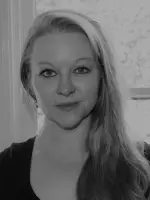 “I'd have to say it's water—I don't know if I was always terrified, but not being able to see what was in there and the fact it can TOUCH you—gah! A lot of my characters have a fear of water, and I'm fascinated by stories of flooded towns and ghost ships. While fish are, on their own, frankly terrifying (THEY TOUCH YOU, EW) I've realized I'm at least half convinced a skeletal hand from a rotting corpse is reaching for me through the murk.”
“I'd have to say it's water—I don't know if I was always terrified, but not being able to see what was in there and the fact it can TOUCH you—gah! A lot of my characters have a fear of water, and I'm fascinated by stories of flooded towns and ghost ships. While fish are, on their own, frankly terrifying (THEY TOUCH YOU, EW) I've realized I'm at least half convinced a skeletal hand from a rotting corpse is reaching for me through the murk.”
Get Crossroads at Bookshop or Amazon
Adam Cesare, author of "Video Night", "Summer Job", and "Clown in a Cornfield"
“When I was a kid, I was running barefoot on a wood deck and got a splinter in my big toe. Which sounds lame, but it was a really big splinter, about as big as my finger, and it’d gone straight into one side of my toe and through the other.
But that’s not the part that scared me or stuck with me: it was the uncanny moment of looking down, seeing the bit of wood sticking out both sides of my toe, but not feeling any pain… yet. I think about that all the time when I’m writing horror, specifically corporeal horror. How your body can conceptualize injury before your nerves even have a chance to catch up.”
Get Clown in a Cornfield at Bookshop or Amazon
Paul Tremblay, author of "A Head Full of Ghosts", "Survivor Song", and the upcoming "The Pallbearers Club"
“As a one-time (or all-time) card carrying scaredy cat, it's less a specific fear that I'm stuck with than vivid memories of my fears and emotional life as a kid/teenager, which I've written about a lot. Also, I still have the occasional shark nightmare, or ghost nightmare.”
Get The Pallbearers Club at Bookshop or Amazon
Bryan Smith, author of "68 Kill", "Slowly We Rot", and the upcoming "Last of the Ravagers"
“Nothing immediate or obvious springs right to mind. Like being afraid of the dark or monsters under the bed or whatever. I've been writing a long time. Going back to childhood, I guess it's fair to say I wasn't the most well-adjusted kid, at least in the chaos of a public school setting. My early stories were filled with a lot of things that appeal to kids. Dinosaurs and spaceships. Lost world stories. High adventure in general. In part, it was just because that was fun. But looking back, escapism was an obvious factor as well. I liked my stories better than the real world. My home life was fine, but anything beyond the confines of that during those childhood years come with a sense of vulnerability, of not really fitting with everyone else. Of being at odds with the world in general. In stories I could get away from that. I was in control. My protagonists could deal with threats in ways I couldn't. Even today, I tend to feature characters with a misfit element to them, such as my recent The Unseen books. And in a lot of the books there's an underlying fear of vulnerability, of being caught up in the random chaos of a dangerous and uncaring world.”
Get Last of the Ravagers at Amazon
Brian Keene, author of "Terminal", "The Rising", "Dark Hollow", and "The Complex"
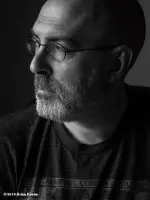 “Not...really. I mean, snakes scared me as a kid and still scare me as an adult, but they've never shaped or impacted my work other than Scratch (my giant snake novella).
“Not...really. I mean, snakes scared me as a kid and still scare me as an adult, but they've never shaped or impacted my work other than Scratch (my giant snake novella).
I would propose that, as I've aged and evolved, so have my fears. When I was a kid, it was snakes. As an adult, it's things like cancer or social upheaval or something happening to my kids.
And at 54, I can see my sixties and seventies on the not so distant horizon, and am beginning to feel the stirrings of a whole new set of fears that go along with that.”
Get Terminal at Bookshop or Amazon
Eric LaRocca, author of "Things Have Gotten Worse Since We Last Spoke" and the upcoming "We Can Never Leave This Place"
“I think the childhood fear that I dragged into adulthood is my fear of abandonment. I was an only child, so I was on my own most of the time and relied heavily on the guidance of my parents. I became acutely aware that once they were gone (if anything happened to them) I would be completely on my own and left to my own devices. I think most of my current work in horror/dark fiction explores this fear of being left alone, being left behind. This is probably most noticeable in my novella, Things Have Gotten Worse..., with the character Agnes being completely disowned by her family because of her sexuality and looking to connect with someone, anyone so that she’s not totally on her own. I think a fear of abandonment is an especially unique catalyst for horror in fiction. It’s interesting to see what characters will do so that they’re not left completely on their own.”
Get Things Have Gotten Worse... at Bookshop or Amazon
Catriona Ward, author of "The Last House on Needless Street" and the upcoming "Sundial"
“Yes indeed, as a teenager I suffered from hypnagogic hallucinations, which in the pre-Google age I thought were ghosts... probably one of the most frightening things that has ever happened to me. I used to wake up in the night with a hand in the small of my back, pushing me out of bed. I would actually fall out of bed, onto the floor. Years later, when I read my first ghost story, I realized—this is where you put it, the fear. Stories are the architecture that contains it.”
Get Sundial at Bookshop or Amazon
Gemma Amor, author of "Dear Laura" and the upcoming "Full Immersion"
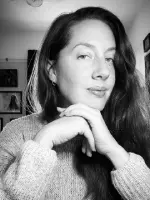 “My childhood fear. Oh, boy. I haven't written about this directly yet because it's my biggest, deepest, darkest childhood fear, but it's one that colours every aspect of my life as an adult and seasons a lot of my relationships with a faintly bitter aftertaste, and, I suppose, my fiction: the fear of abandonment. In the context of a horror novel, I suppose I could be more specific. Children, left alone. The entire concept terrifies me from my toenails to my hairline. Why? I imagine it's not hard to figure out why. As a baby, I was abandoned by my father and my mum was left to raise me by herself. Later on in life, my stepfather also had a tasty little habit of abandonment. My favourite (I use the word with a wry expression on my face) memory is the time he packed up and moved out while I was watching television one night. We lived in a large house in the countryside. My mother worked late shifts at a local garden and DIY centre. She came home after midnight, wild-eyed and pale. 'Where is he?' she asked, aghast, and I realized then how late it was. And then I realized other things. That certain items were missing. Clothes. His briefcase. His car. Him. I also knew I wasn't supposed to watch television past eight o' clock. I was supposed to be in bed by eight-thirty. This meant I'd been alone in the house, in the dark, for four hours. I was nine. I've been afraid of being left alone ever since.
“My childhood fear. Oh, boy. I haven't written about this directly yet because it's my biggest, deepest, darkest childhood fear, but it's one that colours every aspect of my life as an adult and seasons a lot of my relationships with a faintly bitter aftertaste, and, I suppose, my fiction: the fear of abandonment. In the context of a horror novel, I suppose I could be more specific. Children, left alone. The entire concept terrifies me from my toenails to my hairline. Why? I imagine it's not hard to figure out why. As a baby, I was abandoned by my father and my mum was left to raise me by herself. Later on in life, my stepfather also had a tasty little habit of abandonment. My favourite (I use the word with a wry expression on my face) memory is the time he packed up and moved out while I was watching television one night. We lived in a large house in the countryside. My mother worked late shifts at a local garden and DIY centre. She came home after midnight, wild-eyed and pale. 'Where is he?' she asked, aghast, and I realized then how late it was. And then I realized other things. That certain items were missing. Clothes. His briefcase. His car. Him. I also knew I wasn't supposed to watch television past eight o' clock. I was supposed to be in bed by eight-thirty. This meant I'd been alone in the house, in the dark, for four hours. I was nine. I've been afraid of being left alone ever since.
Abandonment. A child's biggest fear, and this adult writer's biggest fear, too. One day it'll be in a book. For now, those endangered kiddos will keep stealing into my work. Poor darlings.”
Get Dear Laura at Bookshop or Amazon
T. J. Tranchell, author of "Cry Down Dark" and "Tell No Man"
"This will get dark, but since I was six, I’ve been afraid of outliving all the people I love. My cousin/best friend drowned in a pool at that age and that was my first brush with death. There’s an irrational surety that everyone I love or even get close to, will die before me. This played out again when a friend (I admit I was deeply in love with but blew it) died of a brain tumor when she was 23. Cry Down Dark, my first book, was me dealing with that grief. And so now, one of my younger brothers is in the hospital after having a seizure. Of course I fear the worst, because that’s what I do. When the pandemic started, my wife said, “Can you imagine something like this ever happening?” Without missing a beat, I said, “Yes. I imagine this all the time.”"
Get Tell No Man at Bookshop or Amazon
Hailey Piper, author of "Queen of Teeth", "The Worm and His Kings", and the upcoming "Your Mind Is a Terrible Thing"
"I had the usual kid fear that there was something in the dark, and I'd be afraid to move or else it would know I was there, too. I think there's still some of that in me. I dismiss it, but too often that feeling creeps in of "I should be alone, but I feel like I'm not." For my work, I often find myself writing solitary characters, plagued out of loneliness by memories, or ghosts, or an uncertainty whether there's a difference. There's also the woods. I grew up with deep, far-reaching woods at back yard's edge, and at night all you can see is a black curtain and occasional animal eyes reflecting porch light. I would play there by day, but at night I knew to give the woods its space. I think that love/fear has only grown; the woods are beautiful but dangerous, and a beautiful danger is something I like to incorporate in my work as well."
Get Your Mind is a Terrible Thing at Bookshop or Amazon
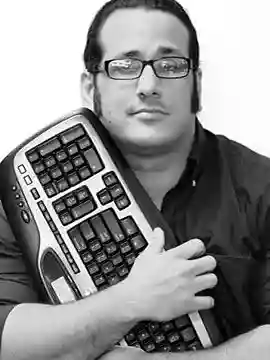
About the author
Gabino Iglesias is a writer, journalist, and book reviewer living in Austin, TX. He’s the author of ZERO SAINTS, HUNGRY DARKNESS, and GUTMOUTH. His reviews have appeared in Electric Literature, The Rumpus, 3AM Magazine, Marginalia, The Collagist, Heavy Feather Review, Crimespree, Out of the Gutter, Vol. 1 Brooklyn, HorrorTalk, Verbicide, and many other print and online venues. Y








